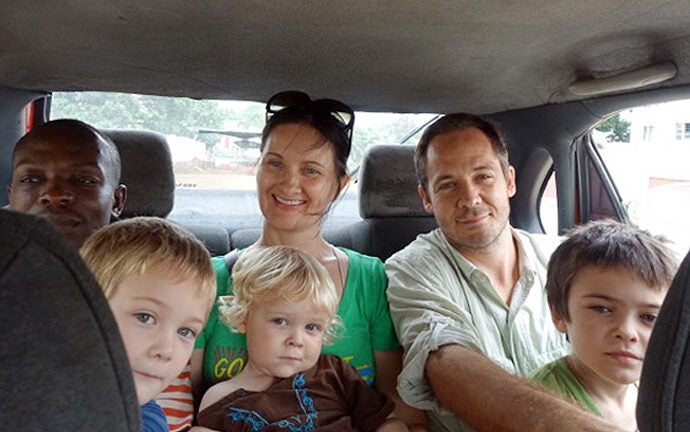
Poetry and the aftermath of war in Africa
Imagine arriving with your partner and three young children at the Abidjan airport in Ivory Coast after 16 hours in flight. All of your possessions are squished into 10 suitcases limited to 50 pounds each.
Now you have to find a place to live.
Sound stressful? It is, but that uncertainty is all part of the adventure for Todd Fredson, poet and USC Dornsife Ph.D. student, and his family.
Fredson and his partner, Sarah Vap — also a poet and USC Dornsife Ph.D. student — and their three sons started their journey in September. They will spend nine months in Abidjan’s environs as part of Fredson’s Fulbright fellowship.
Not that Fredson, who is studying in the Ph.D. in Literature and Creative Writing Program, is a stranger to Africa. He volunteered for the Peace Corps in Ivory Coast for more than two years in the early 2000s.
But much has changed in the years since he left western Africa. Violent rebellion by the Ivory Coast Patriotic Movement began two months after Fredson departed in 2002, culminating in a brutal civil war between the Muslim north and the Christian south weeks later.
Fredson, too, has changed, though in less revolutionary ways. At 39, he’s happily co-parenting his sons (ages 2, 6 and 9), wedging his poetry and studies into as many waking hours as he can get.
The adventure and discomfort of travel abroad feeds the couple’s creative streaks. They document a previous journey through South America in their co-written poetry chapbook, “Echolalia.” Fredson’s poetry and writing, particularly his latest collection, “Century Worm,” draw heavily — nearly claustrophobically, he said — on his earlier time in Ivory Coast, infused with earthy images of poverty and hardship and the humanity found within each.
I was an expert at sleeping on dirt floors
and drinking from gourds. Expert at severing the palm root,
pushing over the trunk, and draining the pith for wine.
“Waking, Midlife,” Todd Fredson, Lingerpost, Issue 3, January 2012
Ivorian poetry
With Ivory Coast’s return to stability and the cushion of Fulbright funding, Fredson and Vap will tutor their sons in West African culture and French, while Fredson immerses himself in studying the nation’s literature and sociopolitical background.
War’s aftermath underlies Fredson’s own story. His grandfather fought in World War II, and his father in Vietnam, but neither spoke of what they endured. Seeing Ivory Coast grapple with violence after a failed military coup granted him a greater understanding of his father and grandfather. He has followed the nation’s power struggles and civil unrest for years, and now he wants to see how violence is expressed in Ivorian poetry.
“I want to shatter the silence that structures trauma and pain, even if just in the most personal sense.” — Todd FredsonThrough the electronic threads of the Internet, he connected with three poets in the southern region who will form the center of his study. He hopes to travel to the rural and less-developed north to meet others.
“The Fulbright brings me to a completion of this really special time and place in my life,” Fredson said. “I’ll be able to transition that desire beyond the nostalgic and see what life is like there now, as an adult, as a father, and to view it through a professional lens.”
Making acquaintances
Like most of western Africa, Ivory Coast has a strong storytelling and music tradition. While written poems and books are common in the country’s south, the northern region’s verses and narratives are less available in written forms. Fredson hopes to meet and build relationships with storytellers and other language artists once he is in the north.
He’ll begin his study and translation with the written works of three Ivory Coast poets: Azo Vauguy, Josué Guébo and Tanella Boni. Each tackles the country’s civil unrest, but their styles are different.
By translating their work into English, Fredson aims to amplify their voices, as well as the experiences of the nation’s people. It’s a legacy he wants to leave for the writers and the war-weary Ivorians, as well as for his sons.
The University of Nebraska Press will publish one of the books in 2017, and Action Books, affiliated with the University of Notre Dame, will publish another in 2016.
“I want to shatter the silence that structures trauma and pain, even if just in the most personal sense,” Fredson said. “I had to go far away to experience trauma and terror on my own, unwittingly — but there it was. And now I hope to snuff out that line of trauma, which seems to keep manifesting, before my sons feel they have to find a way to understand it experientially. I want to start giving it expression, in my own poetry and also through these translations.”